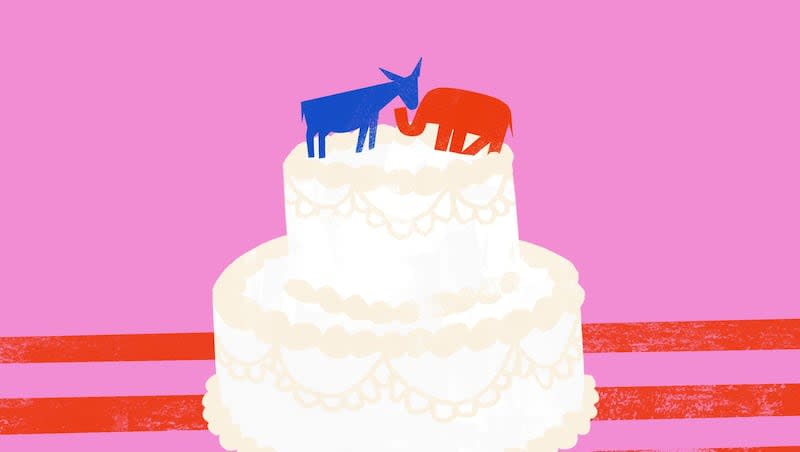Most Utahns willing to date across political lines

The political dating gap has widened as polarization in America has increased, but Utah might be one of the states bucking the trend.
While many people, especially in younger generations, have increasingly said they would not date someone with different politics, a recent poll from the website Dating Advice found that 77% of single Utahns are open to dating across the political spectrum.
The Beehive State is above the national average of 63%.
There were only three states with a higher percentage of respondents saying they would date anyone, regardless of party affiliation: Delaware, Kansas and West Virginia. This means that would-be Republican Romeos and Democratic Darcys don’t have to worry as much about partisan affiliation in these states as they would in other states. Only 8% of Utah Democrats and 15% of Utah Republicans said they would not date someone of the opposite political affiliation.
Though Utah might be bucking the national trend, it’s clear that politics has increasingly become a dealbreaker. A 2020 YouGov poll of 5,462 Americans found that 39% would not date someone across the political divide.
Wendy Wang, director of research at the Institute for Family Studies, observed that the political gap in marriage has widened, too. Writing for The Hill, she said that in 2016, 30% of marriages were politically mixed, but only 21% were in 2020.
Though this trend has emerged across the country, it’s a little complicated. Daniel A. Cox, director of the Survey Center on American Life, wrote in a survey report, “Despite the salience of politics in dating, partisans appear to place less importance on dating someone who exactly shares their affiliation.”
“About half of Republicans (51 percent) and Democrats (54 percent) say they would be more likely to date someone who identifies with their respective party,” Cox continued.
The political dating gap is particularly pronounced when it comes to voting, not just political self-identification. Pew Research Center published survey findings in 2020 saying 71% of respondents who are Democratic or lean that way would not date a Donald Trump voter — 43% said they would not date a Republican. Whereas 47% of Republicans said they would not date a Hillary Clinton voter and 24% said they would not date a Democrat.
Dating isn’t the only relationship impacted by political divides.
Self-identified Republicans told the Public Religion Research Institute in a 2022 Social Networks Survey that 58% of their close friends were Republicans as well. Democrats said 59% of their close friends shared their same political party affiliation, too.
Compared to older generations, younger generations are also more likely to say they found out about their partner’s political beliefs before they started to date them, according to the American Perspectives Survey. Dating apps are part of the equation — there are options to put political preferences in profiles.
The political dating gap comes as younger generations are drifting apart politically.
Analyzing data from the General Social Survey, Lyman Stone and Brad Wilcox wrote in The Atlantic, “Young single men have been moving to the right, even as their female peers have been moving even further left. About 10 percent of such men were conservative in the early 1980s, but that share has now risen to about 15 percent (while the proportion of single liberal young men has held steady at about 18 percent in recent years).”
This, coupled with younger generations not wanting to date across the aisle, could spell trouble for marriage rates, Stone and Wilcox said.
Jeanne Safer, author of “I Love You, But I Hate Your Politics,” spoke to The Wall Street Journal about how to keep relationships healthy amid political disagreements. Safer is a psychologist and a Democrat — she is married to a Republican senior editor at the National Review.
Speaking from her research and personal experience, Safer said to avoid political fights and opt for civil discussion when possible.
“People have a feeling that avoiding things is somehow weakness or hypocrisy. I’ve learned that it’s wisdom and civility,” Safer said. “And there are many things that are more important than politics: how the person treats you; if someone rejoices for your success and grieves for your troubles and backs you up; if you enjoy your time together. These are the things that count.”

